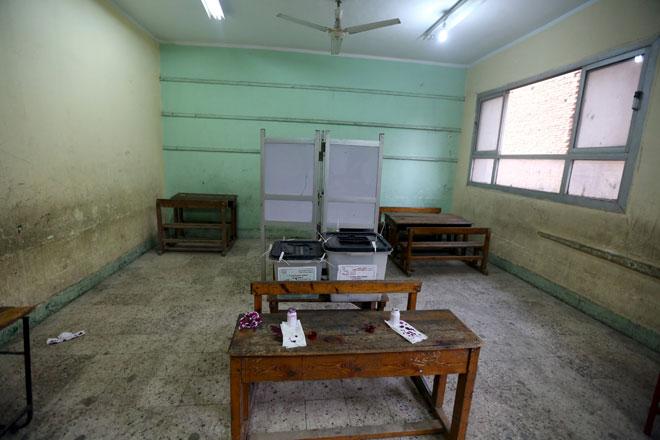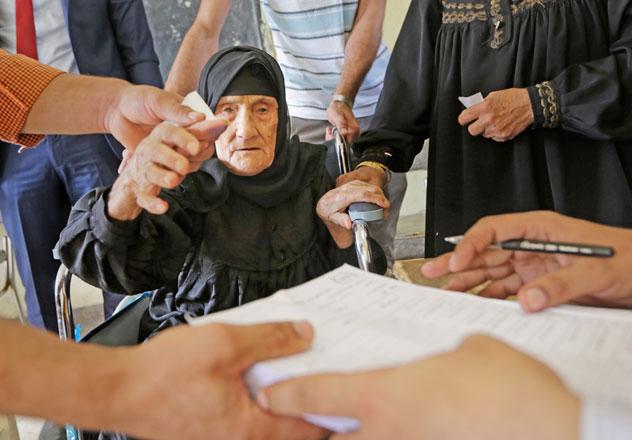You are here
Low turnout in first Egypt parliament poll after Islamists crushed
By AFP - Dec 05,2015 - Last updated at Dec 05,2015
CAIRO — About 28 per cent of Egyptian voters cast ballots in a staggered parliamentary election dominated by pro-government candidates following a crackdown on the main Islamist opposition group, the election committee announced Friday.
Ayman Abbas, head of the election committee, announced at a press conference that 28.3 per cent of voters, roughly 15 million people out of a total of some 53 million, had cast ballots in voting that took place over more than six weeks.
Voters cast ballots for 120 seats that went to party lists and remaining seats for individual candidates.
All party list seats went to the For Love of Egypt coalition, an alliance of parties and groups that support President Abdel Fattah Al Sisi.
The individual seats went to a mix of party-affiliated candidates and independents, Abbas said.
Experts say the new 596-member parliament is expected to have lawmakers who firmly back Sisi.
The new parliament will include 28 presidential appointees, with the rest elected under the complex system of independent candidates and party lists.
Several secular and leftist groups either boycotted the vote or were poorly represented.
The low turnout came more than two years after the military toppled Islamist president Mohamed Morsi and unleashed a deadly crackdown on his Muslim Brotherhood movement, which has since been proscribed.
Thousands of Brotherhood supporters have been jailed and hundreds have been sentenced to death, although many have won retrials.
The group had dominated elections in 2011 and 2012 for a parliament that was dissolved months later by a court on technical grounds.
Widespread apathy
The Brotherhood had faced a strong backlash during Morsi's sole year in power, with millions taking to the street demanding his resignation and prompting the military to intervene.
While the low turnout — compared with high participation for the 2012 parliament — may signal voter apathy or dissent, many people in the country see little use for a parliament.
For decades Egypt had been ruled by a series of strongmen with parliament acting as a rubber stamp, with the brief exception of the last one that was elected after president Hosni Mubarak's overthrow in early 2011.
But its annulment in June 2012, days before Morsi took office, elicited little protest outside Islamist circles, following widespread disillusionment with the bickering and inexperienced parliamentarians.
Though reviled by Islamists and secular dissidents who have not been spared the crackdown on dissent, Sisi remains popular with many who say a strong man is needed at Egypt's helm.
Sisi, the former army chief who ousted Morsi and then won presidential elections, had promised the parliamentary election as the last stage in a return to democracy after toppling his predecessor.
Sisi does not have a party, and had refused to endorse any of the coalitions that contested the election, but he has called for a unified parliament.
The new parliament, as it is, is not likely to challenge the president or repeal laws he has passed in its absence.
Egyptian media outlets have reported that at least 80 members of the parliament were members of Mubarak's National Democratic Party, which was disbanded after his ouster in the 2011 popular uprising.
It also includes colourful characters such as Tawfiq Okasha, a quarrelsome television host who has spoken of plots by Freemasons — among others — against Egypt.
He is joined by Zamalek football club manager Mortada Mansour who had said he stand against Sisi in 2014 — but then announced he had changed his mind after seeking divine guidance.
Related Articles
CAIRO — Egyptians largely stayed away from parliamentary elections for a second day on Monday, highlighting growing disillusionment since th
CAIRO — Egypt wrapped up Wednesday a legislative election that spanned over six weeks but failed to mobilise a high turnout for a parliament
CAIRO — Egyptians turned out in low numbers on Sunday to vote in the first phase of an election hailed by President Abdel Fattah Al Sisi as


















